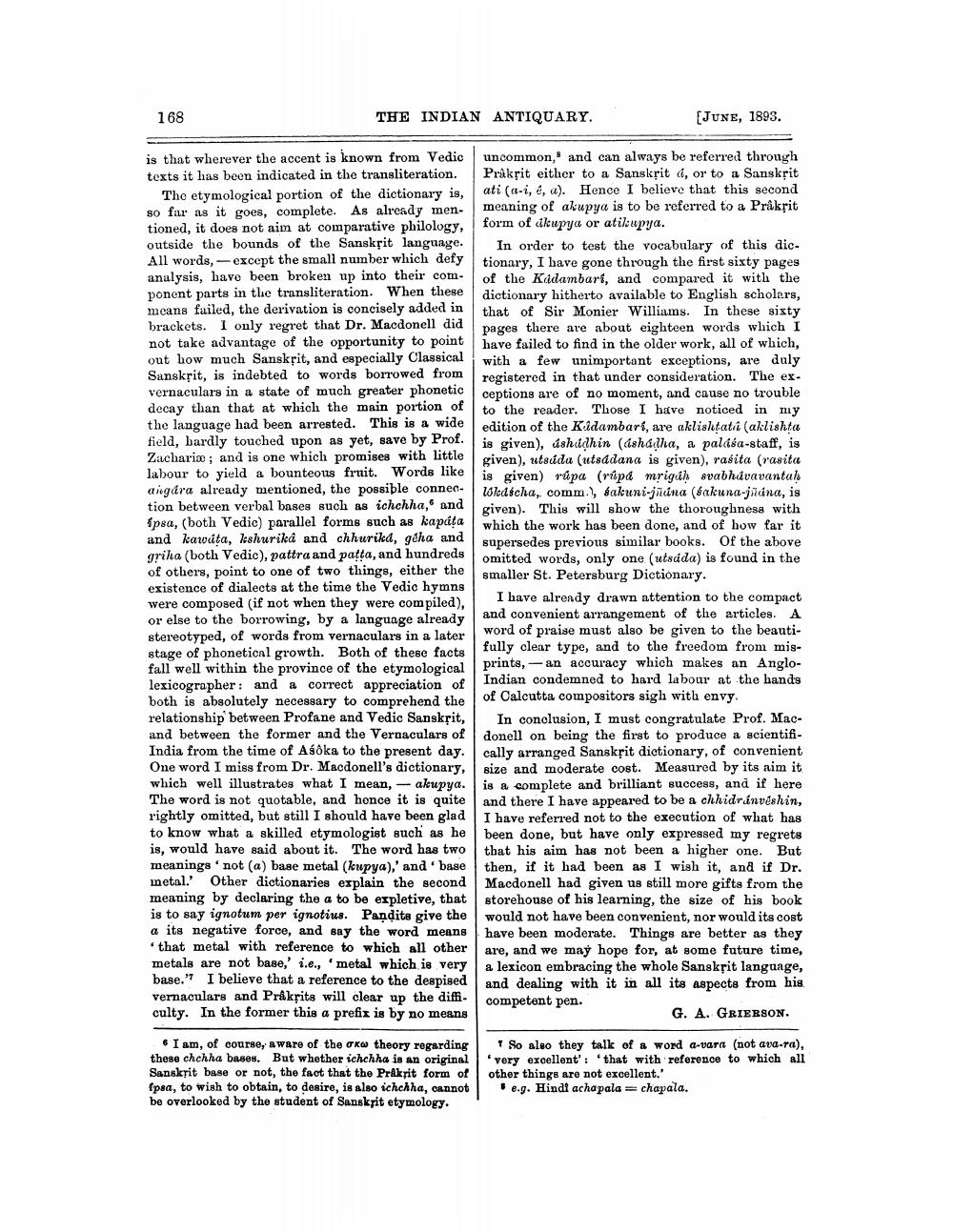________________
168
THE INDIAN ANTIQUARY.
[JUNE, 1893.
is that wherever the accent is known from Vedic uncommon, and can always be referred through texts it has been indicated in the transliteration. Pråkpit either to a Sanskřit , or to a Sansksit
The etymological portion of the dictionary is, ati (a-i, 4. a). Henco I believe that this second so far as it goes, complete. As already men- meaning of akupya is to be referred to a Prakrit tioned, it does not aim at comparative philology, form of ikupya or atikupya. outside the bounds of the Sanskrit language. In order to test the vocabulary of this dicAll words, -except the small number which defy
tionary, I have gone through the first sixty pages analysis, have been broken up into their com
of the Kidambari, and compared it with the ponent parts in the transliteration. When these dictionary hitherto available to English scholars, mcans failed, the derivation is concisely added in
that of Sir Monier Williams. In these sisty brackets. I only regret that Dr. Macdonell did
pages there are about eighteen words which I not take advantage of the opportunity to point
have failed to find in the older work, all of which, out how much Sanskrit, and especially Classical with a few unimportant exceptions, are duly Sanskrit, is indebted to words borrowed from registered in that under consideration. The ex. vernaculars in a state of much greater phonetic ceptions are of no moment, and cause no trouble decay than that at which the main portion of
to the reader. Those I have noticed in my the language had been arrested. This is a wide
edition of the Kidambarí, are aklishtati (aklishta field, bardly touched upon as yet, save by Prof.
is given), úshuidhin (ashálha, a palása-staff, is Zacharia; and is one which promises with little
given), utsuda (utsddana is given), rasita (rasita labour to yield a bounteous fruit. Words like
is given) rúpa (rípa mrigah svabhivavantah angdra already mentioned, the possible connec
Wledócha, comm., bakuni-júna (bakuna-jauna, is tion between verbal bases such as ichchha, and given). This will show the thoroughness with pea, (both Vedio) parallel forms such as kapata
which the work has been done, and of how far it and kawita, leshurika and chhurika, gdha and
supersedes previous similar books. Of the above griha (both Vedic), pattra and patta, and hundreds
omitted words, only one (utsdda) is found in the of others, point to one of two things, either the
smaller St. Petersburg Dictionary. existence of dialects at the time the Vedic hymns were composed (if not when they were compiled),
I have alrendy drawn attention to the compact or else to the borrowing, by a language already
and convenient arrangement of the articles. A stereotyped, of words from vernaculars in a later
word of praise must also be given to the beautistage of phoneticnl growth. Both of these facts
| fully clear type, and to the freedom from misfall well within the province of the etymological prints, an accuracy which makes an Anglolexicographer: and a correct appreciation of
Indian condemned to hard labour at the hands both is absolutely necessary to comprehend the
of Calcutta compositors sigh with envy relationship between Profane and Vedic Sanskrit, In conclusion, I must congratulate Prof. Macand between the former and the Vernaculars of
donell on being the first to produce a scientific India from the time of Asoka to the present day.cally arranged Sanskrit dictionary, of convenient One word I miss from Dr. Macdonell's dictionary, size and moderate cost. Measured by its aim it which well illustrates what I mean, - akupya. is a complete and brilliant success, and if here The word is not quotable, and hence it is quite and there I have appeared to be a chhidrinveshan, rightly omitted, but still I should have been glad I have referred not to the execution of what has to know what a skilled etymologist such as he been done, but have only expressed my regrets is, would have said about it. The word has two that his aim has not been a higher one. But meanings 'not (a) base metal (kupya),' and 'base then, if it had been as I wish it, and if Dr. metal.' Other dictionaries explain the second Macdonell had given us still more gifts from the meaning by declaring the a to be expletive, that storehouse of his learning, the size of his book is to say ignotum per ignotius. Pandits give the would not have been convenient, nor would its cost a its negative force, and say the word means have been moderate. Things are better as they
that metal with reference to which all other are, and we may hope for, at some future time, metals are not base,' i.e., 'metal which is very a lexicon embracing the whole Sanskrit language, base. I believe that a reference to the despised and dealing with it in all its aspects from his vernaculars and Prakrits will clear up the diffi.
competent pen. culty. In the former this a prefix is by no means
G. A. GRIERSON.
I am, of course, aware of the ow theory regarding these chchha bases. But whether ichchha is an original Sanskrit base or not, the fact that the Prakrit form of fpea, to wish to obtain, to desire, is also ichchha, cannot be overlooked by the student of Sanskrit etymology.
So also they talk of a word a-vara (not ava-ra), very excellent' : 'that with reference to which all other things are not excellent.'
e.g. Hindi achapala = chapala.




